HostGator is built for growth. That’s the message front and center on its homepage—and it rings true. With a wide lineup of hosting plans and clear upgrade paths, it’s a fit for first-time site owners and teams running high-traffic properties alike. If you want a provider you can grow with—and won’t outgrow—HostGator delivers.
From brand-new personal blogs to enterprise-grade ecommerce, HostGator’s shared, WordPress, VPS, and dedicated options cover nearly every stage of a site’s lifecycle.
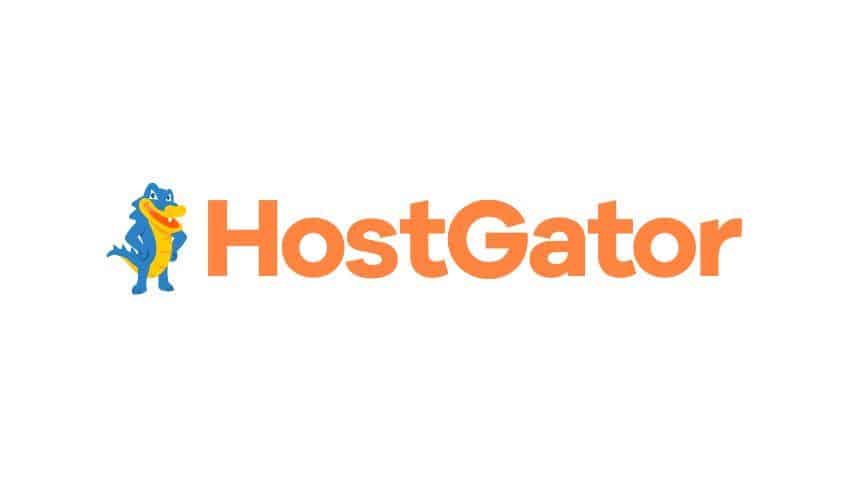
How HostGator Compares to Other Web Hosts in 2026
HostGator is my top pick if you’re looking for a hosting company that scales smoothly. In 2026, its shared plans include modern SSD storage with sensible caps and clear website limits, and upgrading to managed WordPress, NVMe VPS, or dedicated servers is straightforward. Whether you’re starting from scratch or already pulling steady traffic, the platform gives you room to grow without forcing a migration to a new provider.
If your aim is to build a site that attracts and sustains a large audience, confidence in your host matters. HostGator earns a top spot because it’s flexible, familiar (cPanel), and ready for long-term scale.
Where HostGator Shines
Fun fact: the gator mascot’s name is Snappy. Cute, sure—but the real reason HostGator stands out is the mix of ease of use, generous plan resources, and simple upgrade paths.
Beyond the branding, the platform feels approachable for beginners and capable for pros. Onboarding, security, and resource scaling are where it performs best.
Ease of Use (The Good)
Sign-up is quick. You’ll need a domain (you can register one during checkout). Payments work with credit card or PayPal.
During registration you create a Security PIN used to verify your identity with support, and you can enable two-factor authentication (2FA) for your HostGator portal and cPanel to harden logins. That’s a welcome security baseline that many budget hosts still treat as optional.
After activation, a guided setup walks you through essentials like connecting your domain, creating email, and hardening security. New users won’t feel lost.
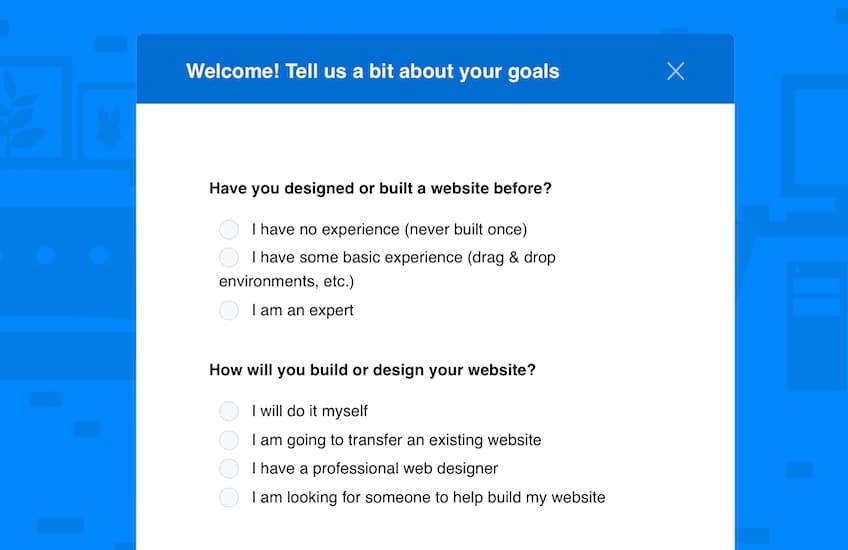
Next, you’ll pick a content management system (CMS) like WordPress to build your site.
Choose a WordPress hosting plan for one-click WordPress installation. On standard shared hosting, you can:
- Install WordPress in one click
- Use the legacy Gator Website Builder if you already have it on an existing account (it’s not offered to new signups)
- Upload your own CMS via FTP
- Install platforms like Joomla, Drupal, or Magento from the app installer
You can also skip setup and return to it later from your dashboard. A prominent workflow makes it easy to pick up where you left off.
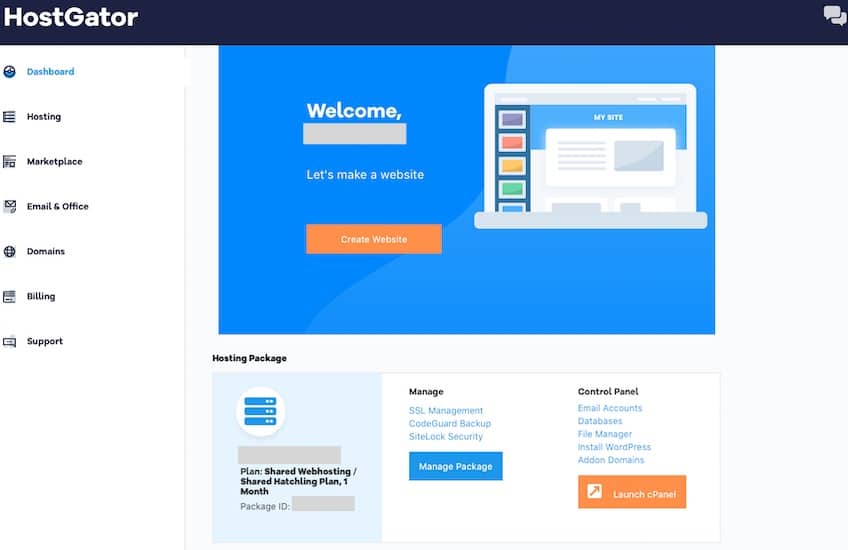
The main dashboard is intuitive, though upsell banners do appear often.
From the sidebar, you can manage hosting, domains, billing, and the HostGator marketplace for optional add-ons.
Many add-ons support growth—SEO plugins, email, advanced security, and backups—so you can layer them in when you’re ready.
For advanced control, HostGator uses cPanel. Newcomer-friendly tooltips help explain options like PHP versions, DNS, backups, and security, which lowers the learning curve.
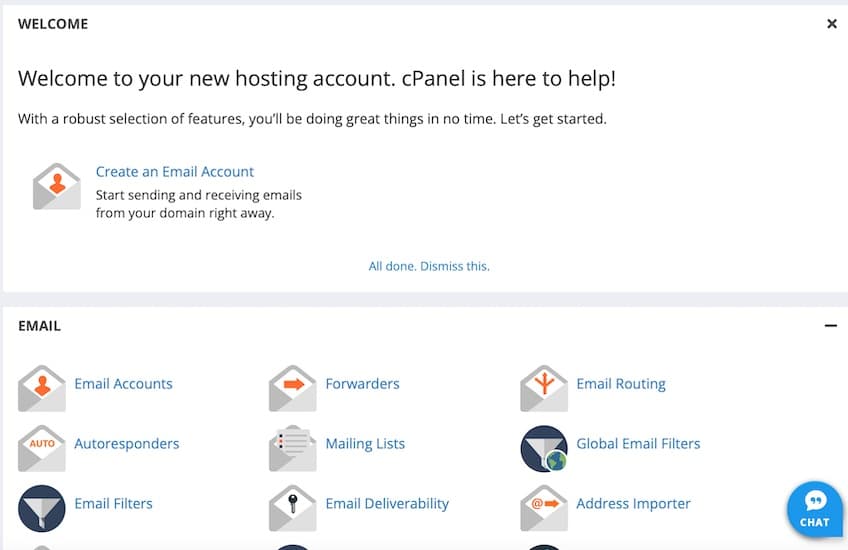
Scalability
Scalability is HostGator’s sweet spot. Shared hosting now comes in tiers that balance site count and SSD storage, with clear steps up to NVMe VPS and dedicated servers when you need more power.
Most beginners start on the Hatchling tier. It’s purpose-built for small sites and includes modern essentials (free SSL, email, one-click installers, unmetered bandwidth) plus SSD storage for snappy performance.
When it’s time to grow, you can upgrade within shared hosting right from your dashboard—or jump to managed WordPress, VPS, or dedicated with help from support. Expect more CPU/RAM, NVMe storage on VPS, and greater control as you move up.
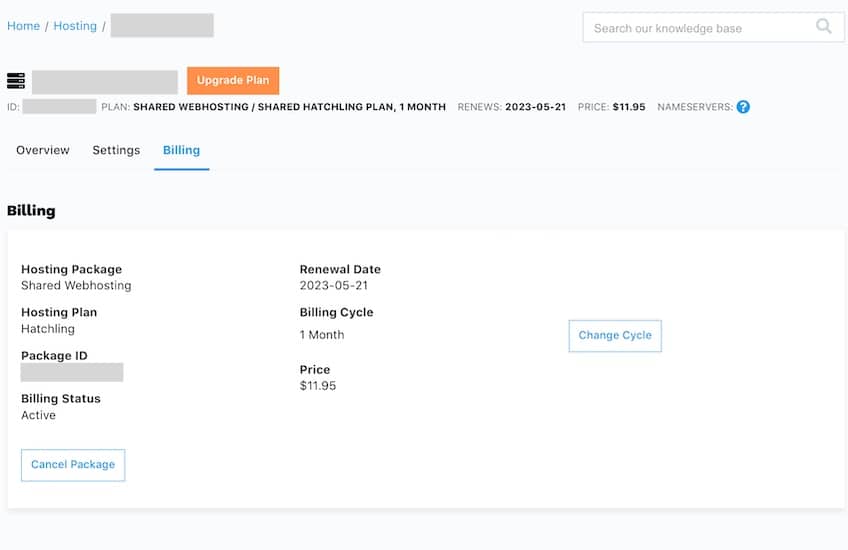
Beyond shared hosting, you can choose from multiple hosting tiers:
- NVMe VPS Hosting: flexible resources with root access; regular rates vary by term and whether you include cPanel
- Dedicated Hosting: enterprise-grade performance with full server control
- Reseller Hosting: no longer offered for new signups (existing customers are still supported)
Each tier has multiple terms and intro promos. You can self-upgrade within shared plans; moving to VPS/dedicated typically involves support to coordinate migrations and configuration.
Where HostGator Could Improve
HostGator is beginner-friendly and affordable, but a few issues keep it from being best-in-class for everyone.
Customer Support
Support is available 24/7 via live chat and phone on shared plans. The knowledge base is robust, but some users report occasional long chat queues or being pointed to articles instead of receiving hands-on fixes. Overall responsiveness still trails leaders like SiteGround and WP Engine, especially for complex issues.
On the plus side, HostGator’s knowledge base is extensive and cPanel makes many tasks DIY-friendly. Still, critical issues often benefit from faster, more proactive human help.
Ease of Use (The Not-So-Good)
The dashboard UI is clean, but two things can frustrate new users: there’s no temporary domain for building before your domain is ready (you can use a preview URL, but it’s not the same as a temp domain), and some renewal pricing details only become obvious at checkout or in your portal.
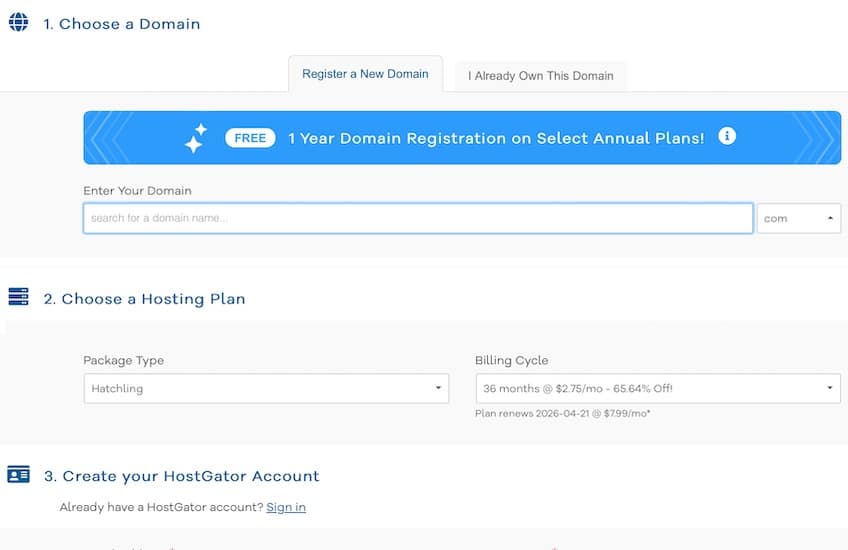
Checkout is full of upsells. Introductory rates are attractive, but renewals jump to regular pricing after the first term. Read the plan comparison and renewal charts closely.
Finally, the Gator Website Builder is a separate product and is not available to new shared-hosting signups. If you want a drag-and-drop experience, you’ll likely use WordPress with a visual builder plugin or consider a dedicated site-builder platform.
Pricing & Plans
HostGator’s shared hosting lineup includes SSD storage, unmetered bandwidth, free SSL, email, and a free domain for the first year (on qualifying terms). Plan limits and features are designed to map to common growth stages.
- Hatchling Plan: Promotional pricing often starts around a few dollars per month on longer terms; includes up to 10 websites, 10 GB SSD storage, unmetered bandwidth, and one-click WordPress installs (24/7 chat & phone support)
- Baby Plan: Typically a small step up in price; includes up to 20 websites, 20 GB SSD storage, Cloudflare CDN, and 24/7 chat & phone support
- Business Plan: Priced higher but adds up to 50 websites, 50 GB SSD storage, a dedicated IP, and an automatic upgrade to a premium SSL—strong options for online stores and high-trust sites
Plans are available month-to-month or in 6-, 12-, 24-, and 36-month terms. Longer initial terms get the best introductory rate, then renew at the regular price listed in HostGator’s price chart.
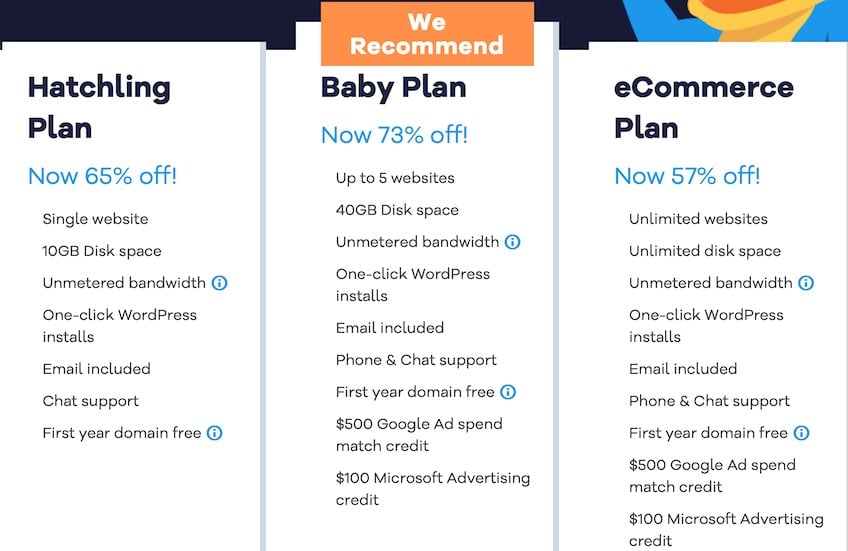
As a reference point for renewals on shared hosting, current regular rates (not promos) are about $10.99/month for Hatchling (on a 36-month term), $16.49/month for Baby, and $21.99/month for Business, with higher monthly rates on shorter terms. Month-to-month renewals are higher (e.g., Hatchling $17.59/month).
Here’s an example of four-year costs for Hatchling, using typical promos and current regular renewal rates:
- Monthly billing: $17.59/month × 48 = $844.32
- Six-month terms: $15.39/month regular × 48 = $738.72
- One-year first term: promo ~$3.75/month for 12 months ($45.00), then 36 months at $10.99/month ($395.64) — $440.64 total
- Three-year first term: promo ~$3.75/month for 36 months ($135.00), then 12 months at $10.99/month ($131.88) — $266.88 total
Beyond base plan pricing, expect optional add-ons that affect your total:
- Domain registration: Free for the first year on eligible terms; .com renewals are typically $23.99/year (other TLDs vary)
- Domain privacy: Optional WHOIS privacy to keep your registration details private (Business includes domain privacy free for the first year)
- SSL certificates: Let’s Encrypt SSL is included; premium SSL options are available (e.g., Positive SSL is $39.99/year)
- Security & backups: SiteLock security and CodeGuard automated backups are available as paid add-ons; pricing depends on the plan and term you choose
If you try HostGator and it’s not a fit, there’s a 30-day money-back guarantee. Cancellations are initiated from Billing in your portal; refunds typically process in a few business days.
Still comparing providers? My guide to the best web hosting services explains how top hosts stack up and which are best for specific needs like WordPress, ecommerce, and high-growth sites.
